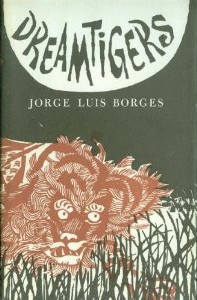Dreamtigers: Difference between revisions
Appearance
Content deleted Content added
Robina Fox (talk | contribs) |
No edit summary |
||
| Line 2: | Line 2: | ||
[[File:Dreamtigers.jpg|thumb|First English edition<br>(publ. [[University of Texas Press]])]] |
[[File:Dreamtigers.jpg|thumb|First English edition<br>(publ. [[University of Texas Press]])]] |
||
'''''Dreamtigers''''' (''El Hacedor'', "The Maker", 1960) |
'''''Dreamtigers''''' (''El Hacedor'', "The Maker", 1960) is a collection of poems, short essays and literary sketches by the Argentine author [[Jorge Luis Borges]]. Divided fairly evenly between prose and verse, the collection examines the limitations of creativity. Borges regarded ''Dreamtigers'' as his most personal work. In the view of [[Mortimer Adler]], editor of the ''[[Great Books of the Western World]]'' series, the collection was a masterpiece of 20th-century literature. Literary critic [[Harold Bloom]] includes it in his ''[[The Western Canon|Western Canon]]''. |
||
The original Spanish title refers to the [[Scots language|Scots]] word ''[[makar]]'', meaning "poet".<ref>Jorge Luis Borges. ''The Aleph and other stories, |
The original Spanish title refers to the [[Scots language|Scots]] word ''[[makar]]'', meaning "poet".<ref>Jorge Luis Borges. ''The Aleph and other stories, 1933–1969: together with commentaries and an autobiographical essay''. E. P. Dutton, 1978. Page 277. <br />Norman Thomas Di Giovanni. ''The lesson of the master: on Borges and his work''. Continuum International Publishing Group, 2003. Pages 164–5.</ref> |
||
==Works== |
==Works== |
||
Revision as of 13:02, 7 April 2023

(publ. University of Texas Press)
Dreamtigers (El Hacedor, "The Maker", 1960) is a collection of poems, short essays and literary sketches by the Argentine author Jorge Luis Borges. Divided fairly evenly between prose and verse, the collection examines the limitations of creativity. Borges regarded Dreamtigers as his most personal work. In the view of Mortimer Adler, editor of the Great Books of the Western World series, the collection was a masterpiece of 20th-century literature. Literary critic Harold Bloom includes it in his Western Canon.
The original Spanish title refers to the Scots word makar, meaning "poet".[1]
Works
| Spanish title | English title |
|---|---|
| "El hacedor" | "The Maker" |
| "Dreamtigers" | "Dreamtigers" |
| "Diálogo sobre un diálogo" | "A Dialog About a Dialog" |
| "Las uñas" | "Toenails" |
| "Los espejos velados" | "Covered Mirrors" |
| "Argumentum ornitologicum" | "Argumentum Ornithologicum" |
| "El cautivo" | "The Captive" |
| "El simulacro" | "The Mountebank" |
| "Delia Elena San Marco" | "Delia Elena San Marco" |
| "Diálogo de muertos" | "A Dialog Between Dead Men" |
| "La trama" | "The Plot" |
| "Un problema" | "A Problem" |
| "Una rosa amarilla" | "The Yellow Rose" |
| "El testigo" | "The Witness" |
| "Martín Fierro" | "Martín Fierro" |
| "Mutations" | "Mutations" |
| "Parábola de Cervantes y del Quijote" | "Parable of Cervantes and the Quixote" |
| "Paradiso XXXI, 108" | "Paradiso XXXI, 108" |
| "Parábola del palacio" | "Parable of the Palace" |
| "Everything and Nothing" | "Everything and Nothing" |
| "Ragnarök" | "Ragnarök" |
| "Inferno, I, 32" | "Inferno, I, 32" |
| "Borges y yo" | "Borges and I" |
Notes
- ^ Jorge Luis Borges. The Aleph and other stories, 1933–1969: together with commentaries and an autobiographical essay. E. P. Dutton, 1978. Page 277.
Norman Thomas Di Giovanni. The lesson of the master: on Borges and his work. Continuum International Publishing Group, 2003. Pages 164–5.
External links
- The Floating Library has a complete English translation of Dreamtigers.
- University of Texas Press
